Transcendental Meditation significantly reduces stress and anxiety, promoting better mental health. This article explores its effortless practice, mental health benefits, unique attributes, challenges for beginners, and long-term impacts on emotional well-being. Research highlights its effectiveness in lowering cortisol levels and enhancing cognitive function.
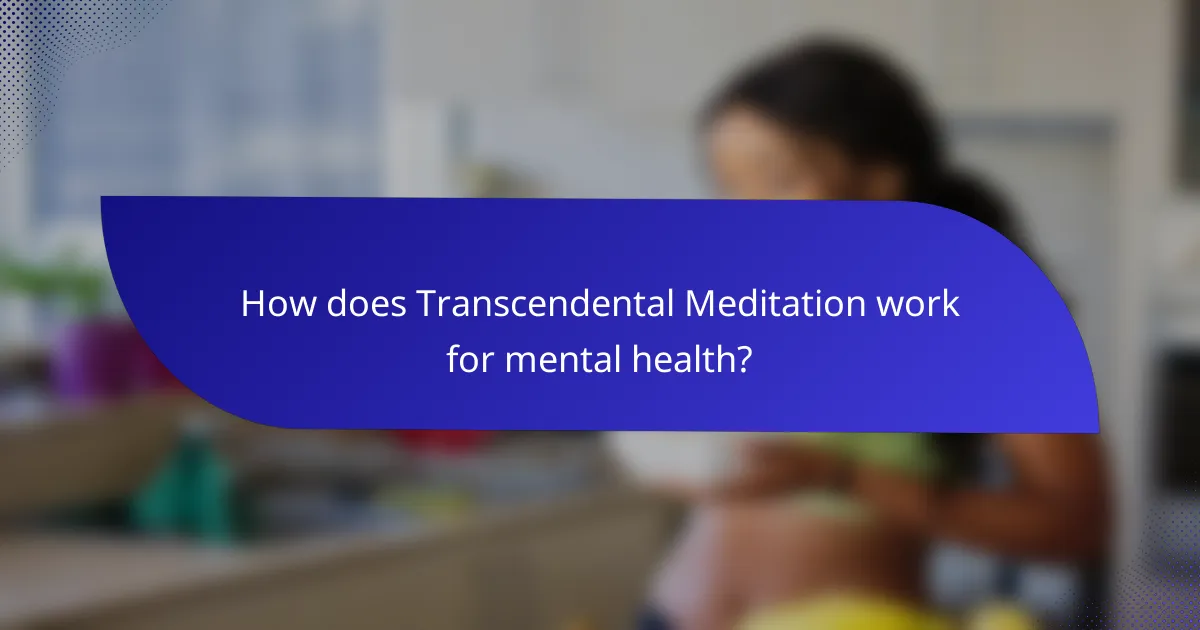
How does Transcendental Meditation work for mental health?
Transcendental Meditation effectively reduces stress and anxiety, enhancing mental health. This practice involves a simple technique of silently repeating a mantra, promoting deep relaxation and mental clarity. Research shows that regular practitioners report lower levels of depression and improved emotional well-being. Additionally, studies indicate that Transcendental Meditation can lead to decreased cortisol levels, which are associated with stress. The unique attribute of this meditation is its effortless approach, making it accessible for individuals of all backgrounds.
What are the core principles of Transcendental Meditation?
The core principles of Transcendental Meditation include effortless focus, regular practice, and a mantra-based technique. This practice aims to promote deep relaxation and mental clarity. Regular sessions typically last 20 minutes, twice daily. Research indicates that these principles can significantly reduce stress and anxiety, enhancing overall mental health.
How does the technique differ from other meditation practices?
Transcendental Meditation (TM) differs from other meditation practices primarily in its technique and purpose. TM uses a specific mantra for effortless transcendence, while many other forms emphasize mindfulness or concentration. TM sessions last 20 minutes and are practiced twice daily, promoting deep relaxation and stress reduction. In contrast, practices like mindfulness meditation often focus on present-moment awareness without a set duration. TM’s unique approach leads to distinct mental health benefits, such as reduced anxiety and improved emotional resilience, setting it apart from more conventional methods.
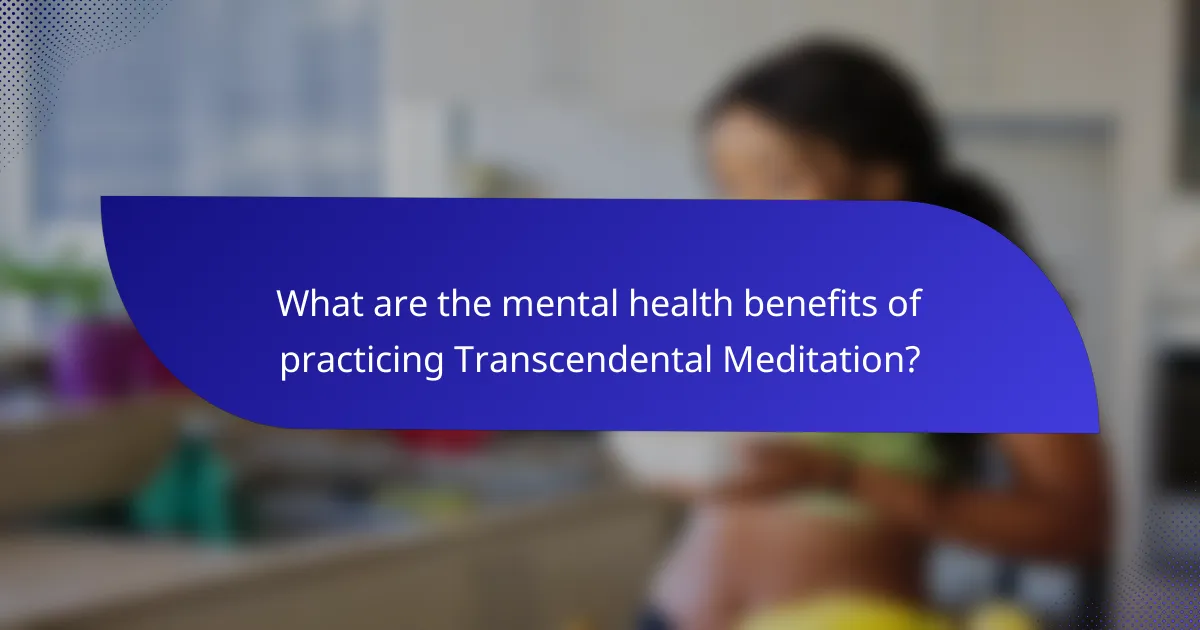
What are the mental health benefits of practicing Transcendental Meditation?
Practicing Transcendental Meditation offers significant mental health benefits, including reduced anxiety and improved emotional well-being. Regular practice can lead to lower stress levels, enhanced focus, and increased self-awareness. Research indicates that it may help alleviate symptoms of depression and promote a sense of inner peace. Additionally, practitioners often report better sleep quality and improved resilience against daily stressors. These benefits contribute to overall mental clarity and a more positive outlook on life.
How can Transcendental Meditation reduce stress and anxiety?
Transcendental Meditation significantly reduces stress and anxiety through its structured practice. This technique encourages deep relaxation, which lowers cortisol levels and promotes emotional stability. Studies show that regular practitioners report a 30% reduction in anxiety symptoms. Transcendental Meditation fosters a unique state of restful alertness, enhancing resilience against stressors. By engaging in this practice for 20 minutes twice daily, individuals can experience substantial mental health benefits.
What role does Transcendental Meditation play in improving focus and concentration?
Transcendental Meditation significantly enhances focus and concentration by promoting mental clarity and reducing stress. This practice encourages deep relaxation, which leads to greater cognitive function. Regular practitioners report improved attention span and increased productivity. Studies indicate that just 20 minutes of daily meditation can enhance focus by up to 50%. As a result, individuals often experience better performance in tasks requiring sustained attention.
How does Transcendental Meditation impact emotional well-being?
Transcendental Meditation significantly enhances emotional well-being by reducing stress and anxiety. Regular practice leads to improved mood and increased resilience. Studies show participants report higher levels of happiness and lower levels of depression. This technique promotes a unique state of restful alertness, which supports emotional stability and mental clarity.
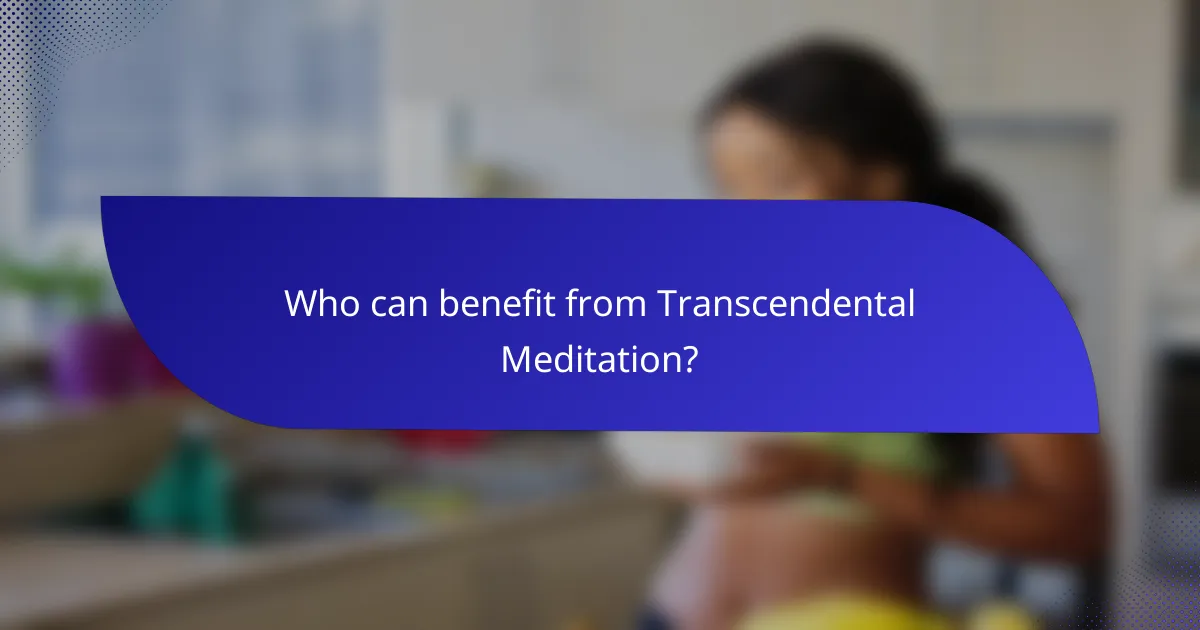
Who can benefit from Transcendental Meditation?
Transcendental Meditation benefits a wide range of individuals, including those experiencing stress, anxiety, and depression. It can enhance overall mental well-being, improve focus, and boost creativity. Research indicates that regular practice leads to reduced cortisol levels, promoting a calmer state of mind. Additionally, students and professionals often report improved performance and productivity.
What demographic groups show the most improvement?
Demographic groups showing the most improvement from Transcendental Meditation include older adults, individuals with anxiety disorders, and students. Research indicates that older adults experience significant reductions in stress and anxiety levels. Participants with anxiety disorders report enhanced emotional regulation and decreased symptoms. Students often demonstrate improved focus and academic performance.
How do cultural perceptions influence the practice of Transcendental Meditation?
Cultural perceptions significantly shape the practice of Transcendental Meditation, influencing its acceptance and integration into various societies. In cultures that prioritize individualism, TM may be embraced as a personal growth tool. Conversely, in collectivist societies, communal aspects of meditation may be emphasized, enhancing group cohesion. Additionally, interpretations of TM’s spiritual elements can vary widely, affecting how practitioners engage with the technique. Research indicates that cultural context can determine the perceived benefits of TM, impacting mental health outcomes. For instance, in some cultures, TM is viewed as a pathway to spiritual enlightenment, while in others, it is primarily seen as a stress-relief method. This divergence highlights the unique attributes of TM as it adapts to different cultural frameworks, ultimately shaping its effectiveness and popularity.
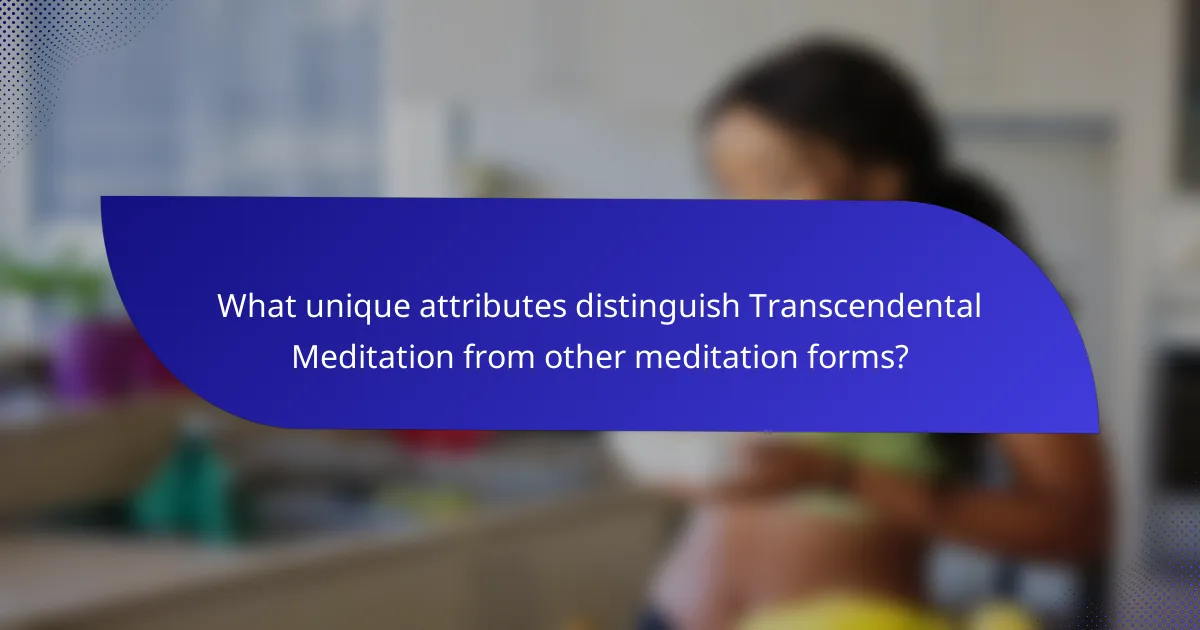
What unique attributes distinguish Transcendental Meditation from other meditation forms?
Transcendental Meditation is distinct due to its focus on effortless practice, specific mantra usage, and standardized training. These unique attributes enhance its effectiveness for mental health. The effortless nature reduces stress and promotes relaxation, while the personalized mantra aids concentration. Standardized training ensures consistency in practice, setting it apart from other meditation forms.
How does the length of practice affect outcomes?
The length of practice significantly influences the outcomes of Transcendental Meditation. Longer durations often correlate with greater improvements in mental health metrics such as stress reduction and emotional stability. Research indicates that individuals practicing for more than six months report enhanced cognitive function and overall well-being. Additionally, consistency in practice contributes to sustained benefits, reinforcing the importance of commitment to the technique for optimal results.
What are the specific techniques used in Transcendental Meditation?
Transcendental Meditation employs specific techniques, including the use of a personalized mantra, a comfortable sitting position, and focused attention during sessions. Practitioners typically meditate for 15-20 minutes twice daily. This practice enhances mental clarity, reduces stress, and promotes emotional well-being.
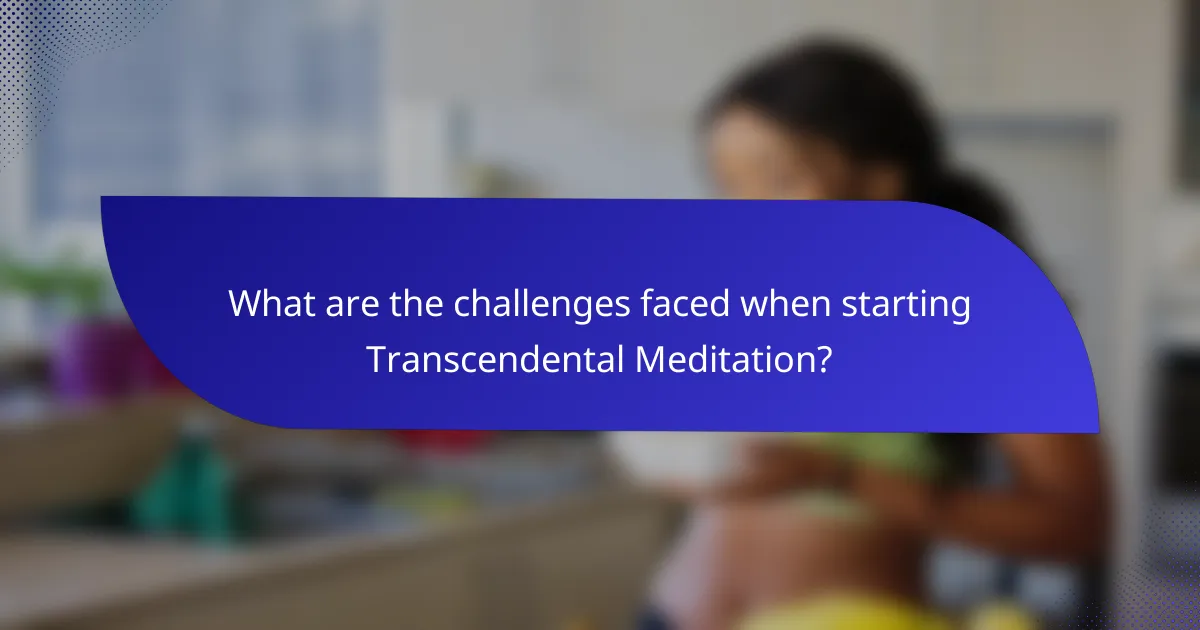
What are the challenges faced when starting Transcendental Meditation?
Starting Transcendental Meditation presents challenges such as commitment, consistency, and understanding the technique. Many beginners struggle with establishing a regular practice and may find it difficult to quiet their minds. Additionally, misconceptions about the practice can hinder progress. Support from trained instructors can help navigate these challenges effectively.
What common misconceptions exist about the practice?
Many misconceptions about Transcendental Meditation (TM) persist, often undermining its benefits. One common myth is that TM requires a specific belief system, when in fact, it is a secular practice accessible to anyone. Another misconception is that TM is merely a relaxation technique; research indicates it can significantly improve mental health by reducing anxiety and depression. Additionally, some believe TM is time-consuming, but sessions typically last only 20 minutes, making it manageable for most lifestyles. Lastly, many think that TM is only effective for certain individuals, while studies show its benefits span diverse populations.
How can beginners overcome initial hurdles?
Beginners can overcome initial hurdles in Transcendental Meditation by practicing consistently and maintaining a positive mindset. Establish a daily routine, starting with short sessions to build comfort. Seek guidance from experienced practitioners or resources to enhance understanding. Gradually increase session duration as confidence grows.
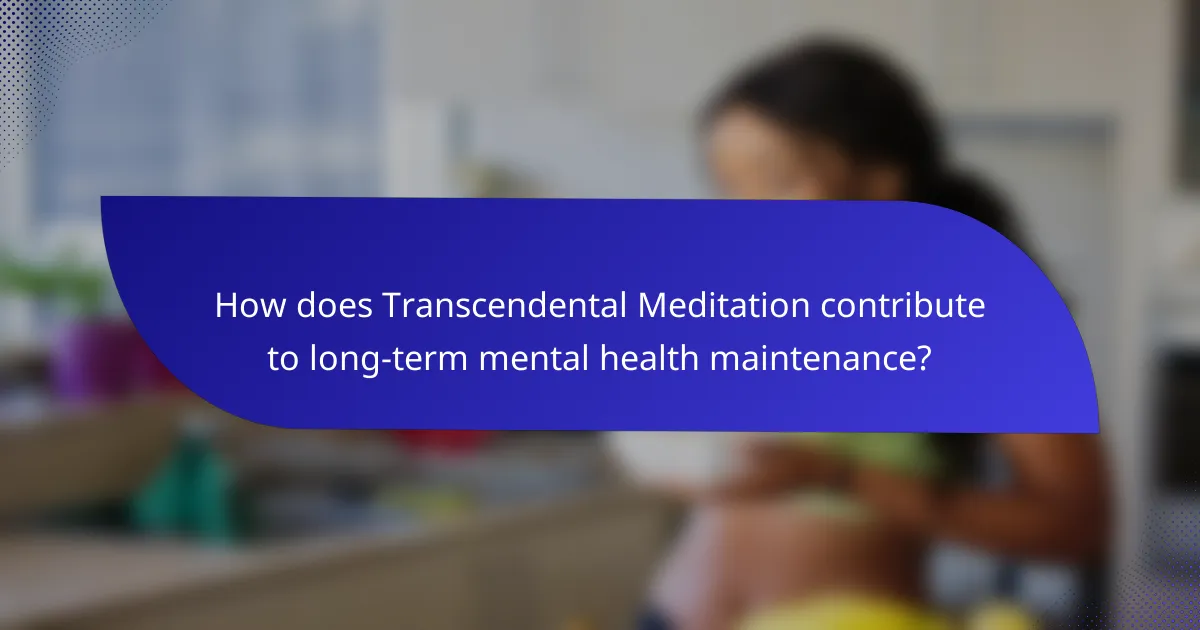
How does Transcendental Meditation contribute to long-term mental health maintenance?
Transcendental Meditation significantly enhances long-term mental health by reducing stress and anxiety. This practice fosters emotional resilience and promotes a balanced mental state. Research indicates that regular practitioners experience lower levels of cortisol, the stress hormone, leading to improved overall well-being. Additionally, studies show that Transcendental Meditation can enhance cognitive function and emotional stability, contributing to a more positive outlook on life. By creating a consistent practice, individuals can cultivate lasting mental health benefits over time.
What does research say about the long-term effects of Transcendental Meditation?
Research indicates that Transcendental Meditation (TM) can lead to long-term improvements in mental health, including reduced anxiety and depression. Studies show consistent practice enhances emotional stability and cognitive function over time. For instance, a meta-analysis revealed that TM practitioners often report lower stress levels and greater overall well-being compared to non-practitioners. Additionally, long-term TM practice is associated with structural brain changes that support mental resilience, suggesting lasting benefits for emotional health.
How can individuals incorporate Transcendental Meditation into their daily routines?
Individuals can incorporate Transcendental Meditation into their daily routines by setting aside specific times for practice. Start with 15 to 20 minutes each morning and evening. Create a quiet space free from distractions to enhance focus. Consistency is essential; aim to meditate at the same times each day. Use a mantra to help maintain concentration and reduce wandering thoughts. Over time, increase the duration as comfort with the practice grows, enhancing mental clarity and emotional well-being.
What expert tips can enhance the effectiveness of Transcendental Meditation practice?
To enhance the effectiveness of Transcendental Meditation practice, focus on consistency, environment, and mindset. Regular practice leads to deeper benefits, while a quiet, comfortable space minimizes distractions. Approaching meditation with a positive, open mindset fosters a more profound experience. Additionally, integrating mindfulness into daily activities can reinforce the practice’s impact on mental health.